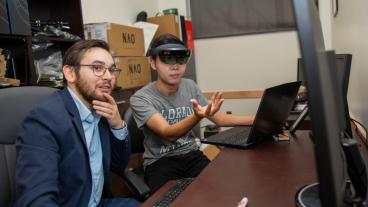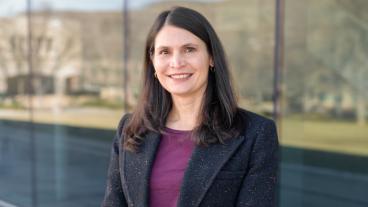Four Mines research projects win Proof of Concept Awards
Contact lenses that can selectively deliver therapeutic drugs, a “spoof proof” smart car key, and carbon-storing concrete are among the recipients of 2021 Proof of Concept Awards from the Mines Office of Research and Technology Transfer.
Now in its 10th year, the awards program supports Mines researchers who need funding for a commercially viable invention with large market potential. Grants range from $10,000 to $35,000 and are awarded via a competitive process. The program is made possible by funding from the Colorado School of Mines Foundation and the Colorado Advanced Industries Program.
This year’s winners include projects related to health and wellness, security and environmentally responsible construction. The winning projects are:
Anuj Chauhan, Chemical and Biological Engineering
Localization of magnetic particle in contact lenses for controlled and targeted ocular drug delivery
Current methods for treating anterior segment ocular diseases, such as eyedrops or intravitreal injections, have drawbacks. Eyedrops have poor patient compliance and low bioavailability. Injections are highly invasive and can cause damage to the retina. Chauhan and his team are developing contact lenses loaded with therapeutic drugs that can target both the cornea and retina via localization of the drugs to specific areas in the lens. There have been approaches to using contact lenses for drug delivery, but none have offered the possibility of selective targeting.
Lori Tunstall, Civil and Environmental Engineering
Engineered char for enhanced strength in cement at increased replacement levels
An estimated eight percent of greenhouse gas emissions are connected to concrete production and application. Many construction companies have pledged to lower their carbon footprint by as much as 50 percent by 2030. But many of the strategies that can be employed to lower the environmental impact of construction also mean higher costs with little impact on the amount of construction waste destined for landfills. To address that challenge, Tunstall and her research team have proposed the idea of adding engineered char to concrete. The char is composed of more than 70 percent carbon that has been sequestered from the atmosphere by plants and locked into very stable chemical bonds through pyrolysis. Making char through the pyrolysis of wood waste would also generate energy that can be incorporated back into the process for reduced energy costs.
Hao Zhang, Computer Science
Spatial thermal assessment technology (STAT) for non-contact temperature checking and social distancing monitoring
To adapt to post-pandemic workspace needs, governments, companies, schools and other entities will be relying on different strategies to ensure employees and students can return safely. One such strategy is finding a way to monitor body temperatures and social distancing without contact. Existing technologies have limitations – thermal imaging devices rely on a single thermal camera core with a limited field of view, while social distancing monitoring systems rely on visual cameras that create privacy concerns or low-accuracy cellphone Bluetooth signals. Zhang and his project team have proposed a low-cost smart omnidirectional imaging device with integrated thermal-spatial sensing and live data analysis for non-contact temperature assessment and social distance monitoring. By integrating multiple functions and eliminating the need for separate devices for each purpose, researchers believe the device will have a competitive advantage over the options already on the market.
Dejun Yang/Sid Saleh, Computer Science and Economics & Business
S3Key: A secure smart key technology
Current smart key technology allows people to open their car’s locks without needing physical keys. Unfortunately, the current technology also comes with risks. Bad actors are able to use electronic devices to relay a wireless signal to trick a car’s access control system into recognizing a spoofed access credential. This leaves smart keys vulnerable to unauthorized users. Yang, Saleh and the rest of the research team have proposed a spoof-proof secure smart key system, which uses device fingerprints created from manufacturing imperfections. Like human fingerprints, device fingerprints can uniquely identify a device, preventing spoofing. This low-cost solution doesn’t require extra hardware or devices and doesn’t require extra effort on the part of the lock owners.




